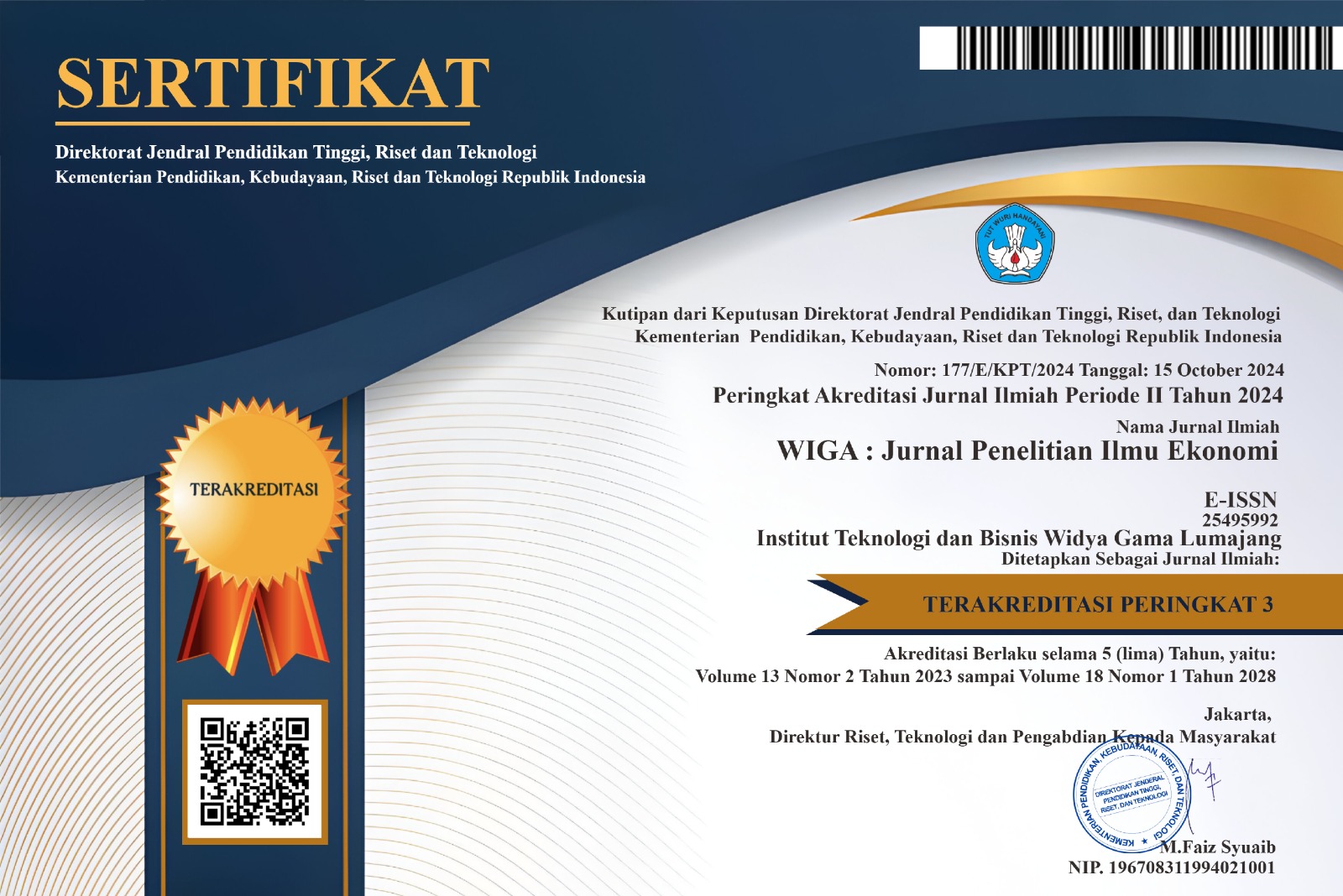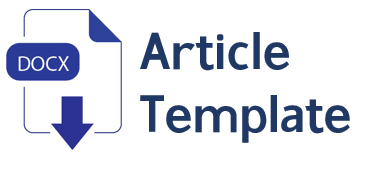Jihat Ammah: Redefinition of Assets in Islamic Boarding Schools Accounting Framework
DOI:
https://doi.org/10.30741/wiga.v12i2.721Keywords:
Asset, Jihat Ammah, Islamic Boarding School Accounting GuidelinesAbstract
Most of study “stuck” on pragmatic level, they have grasped the Islamic boarding school possessing same character with non-profit entity. As a result, all of the accounting concepts have the same “taste” as modern accounting. In particular, asset definition in Islamic Boarding Schools Accounting Guidelines inclined provides same meaning with it. By looking at the nature of Islamic Boarding Schools beyond non-profit entities, this study aims to, first, conduct a “power” review of assets in the Islamic Boarding School Accounting Guidelines through a critical perspective. Second, re-determining definition of Islamic boarding schools asset based on Al-Quran and Kitab Kuning. Through postmodernist aqidah methodology, the research methods used are literature studies, extracting the nature of pesantren through the Kitab Kuning, and in-depth interviews with informants. Extraction of the definition of assets refers to the Qur'an to obtain depth of analysis. Finally, this study re-proposes a definition of Islamic Boarding Schools assets that goes beyond modern accounting in which pesantren assets are classified as Jihat Ammah.
Downloads
References
Bakhtiar, Y. (2019). Multi Perspektif Makna “Keuntungan”: Secarik Kompilasi Keragaman Pemikiran. Prosiding Seminar Nasional Akuntansi, Manajemen, Dan Keuangan, 1(1), Article 1. https://prosiding.polinema.ac.id/sngbs/index.php/snamk/article/view/224
Biduri, S., Rahayu, R. A., & Mukarromah, I. (2019, July). Implementasi PSAK No. 45 pada Penyusunan Laporan Keuangan Pondok Pesantren Demi Terciptanya Transparasi dan Akuntabilitas. Seminar Nasional dan The 6th Call For Syariah Paper (SANCALL), Surakarta. http://publikasiilmiah.ums.ac.id/handle/11617/11393
Chiapello, E. (2007). Accounting and the birth of the notion of capitalism. Critical Perspectives on Accounting, 18(3), 263–296. https://doi.org/10.1016/j.cpa.2005.11.012
Collison, D. J. (2003). Corporate propaganda: Its implications for accounting and accountability. Accounting, Auditing & Accountability Journal, 16(5), 853–886. https://doi.org/10.1108/09513570310505989
Cooper, C. (2015). Accounting for the fictitious: A Marxist contribution to understanding accounting’s roles in the financial crisis. Critical Perspectives on Accounting, 30, 63–82. https://doi.org/10.1016/j.cpa.2014.08.002
Ekasari, K. (2014). Hermeneutika Laba Dalam Perspektif Islam. Jurnal Akuntansi Multiparadigma, 5(1), 67–75. https://doi.org/10.18202/jamal.2014.04.5006
Hamidah, H. (2013). Adoption Of International Financial Reporting Standards (Ifrs) In Indonesia. Journal of Economics, Business, & Accountancy Ventura, 16(2), 355–372. https://doi.org/10.14414/jebav.v16i2.191
Hines, R. D. (1989). The Sociopolitical Paradigm in Financial Accounting Research. Accounting, Auditing & Accountability Journal, 2(1). https://doi.org/10.1108/09513578910134671
Kamla, R. (2009). Critical insights into contemporary Islamic accounting. Critical Perspectives on Accounting, 20(8), 921–932. https://doi.org/10.1016/j.cpa.2009.01.002
Kamla, R., & Haque, F. (2017). Islamic accounting, neo-imperialism and identity staging: The Accounting and Auditing Organization for Islamic Financial Institutions. Critical Perspectives on Accounting, 63, 1–20. https://doi.org/10.1016/j.cpa.2017.06.001
Kieso, D. E., Weygandt, J. J., & Warfield, T. D. (2014). Intermediate Accounting. Second Edition. John Wiley & Sons.
Landali, A., Niswatin, & Yusuf, N. (2020). Metafora DOA sebagai makna laba dalam perspektif Islam. Imanensi: Jurnal Ekonomi, Manajemen, Dan Akuntansi Islam, 5(2), 116–125. https://doi.org/10.34202/imanensi.5.2.2020.116-125
Larson, R. K., & Brown, K. L. (2001). Lobbying of the International Accounting Standards Committee: The Case of Construction Contracts. Advances in International Accounting, 14, 47–73. https://doi.org/10.1016/S0897-3660(01)14005-5
Lee, T. A. (2013). Reflections on the Origins of Modern Accounting. Accounting History, 18(2), 141–161.
Luayyi, S. (2014). Akuntansi Syariah. Makna Aset dan Bentuk Pelaporannya Dari Kaca Mata Pondok Pesantren. Dimar Intermedia.
Mamulati, I. (2015). SIsi Lain Dari Makna Aset Ekonomi. Jurnal Reviu Akuntansi Dan Keuangan, 5(2), 741–750.
Mulawarman, A. D. (2020). Jalan Laba Petani: Falāh al-Fallāh. Jurnal Riset Dan Aplikasi: Akuntansi Dan Manajemen, 4(2), 213–222. https://doi.org/10.33795/jraam.v4i2.008
Probowulan, D., & Martiana, N. (2021). Perspektif Aset Ekonomi Berbasis Keumatan Pada Amal Usaha Muhammadiyah Klinik Kesehatan. Jati: Jurnal Akuntansi Terapan Indonesia, 4(1), 59–69. https://doi.org/10.18196/jati.v4i1.9178
Richard, J. (2015). The dangerous dynamics of modern capitalism (from static to IFRS’ futuristic accounting). Critical Perspectives on Accounting, 30, 9–34. https://doi.org/10.1016/j.cpa.2014.09.003
Rodrigues, L. L., & Craig, R. (2007). Assessing international accounting harmonization using Hegelian dialectic, isomorphism and Foucault. Critical Perspectives on Accounting, 18(6), 739–757. https://doi.org/10.1016/j.cpa.2006.02.007
Romli, M. (2018). Peluang Dan Tantangan Penerapan Sistem Akuntansi Pesantren Indonesia (Santri) Di Indonesia. Ekomadania, 2(1), 35–51.
Rudkin, K. (2007). Accounting as Myth Maker. Australasian Accounting, Business and Finance Journal, 1(2), 13. https://doi.org/10.14453/aabfj.v1i2.2
Senjiati, I. H., Maulida, I. S. R., Suhatman, Z., & Ridwan, I. L. (2020). Pengelolaan dan Penyajian Laporan Keuangan Pesantren Berbasis Akuntansi Syariah: Analisis Kritis Pedoman Akuntansi Pesantren. Jurnal Riset Akuntansi & Komputerisasi Akuntansi, 11(1), 36–64.
Shulthoni, M., & Arifanti, R. (2016). Pemahaman Mahasiswa Akuntansi Tentang Aset, Kewajiban Dan Ekuitas. Journal of Accounting and Business Education, 2(4), Article 4. https://doi.org/10.26675/jabe.v2i4.6076
Solikhah, Sudibyo, Y. A., & Susilowati, D. (2019). Fenomena Kualitas Laporan Keuangan Pesantren Berdasar Pedoman Akuntansi Pesantren Dan Psak No 45. Soedirman Accounting Review, 03(01), 19–39.
Suherman, L. P. (2019). Analisis Pentingnya Akuntansi Pesantren Bagi Pondok Pesantren Al-Matuq Sukabumi. Jati: Jurnal Akuntansi Terapan Indonesia, 2(2). https://doi.org/10.18196/jati.020220
Sukmadilaga, C. (2021). Sosialisasi Pengimplementasian Pedoman Akuntansi Pesantren Berbasis Digital Pada Pesantren Di Indonesia. Dharmakarya, 10(2), Article 2. https://doi.org/10.24198/dharmakarya.v10i1.25353
Zeff, S. (2002). “Political” Lobbying on Proposed Standards: A Challenge to the IASB. Accounting Horizons, 16(1), 43–54. https://doi.org/10.2308/ACCH.2002.16.1.43
Zhang, E., Andrew, J., & Rudkin, K. (2012). Accounting as an instrument of neoliberalisation?: Exploring the adoption of fair value accounting in China. Accounting, 25. https://doi.org/10.1108/09513571211275470
Zhang, Y., & Andrew, J. (2014). Financialisation and the Conceptual Framework. Critical Perspectives on Accounting, 25(1), 17–26. https://doi.org/10.1016/j.cpa.2012.11.012.
Downloads
Published
How to Cite
Issue
Section
License
Copyright (c) 2022 Binti Shofiatul Jannah, M. Luthfillah Habibi, Mochammad Ilyas Junjunan, Ratna Anggraini Aripratiwi

This work is licensed under a Creative Commons Attribution-NonCommercial 4.0 International License.










